
Guests
- Charlene Carruthersthe national director of the Black Youth Project 100.
- Michael Oppenheimerattorney for the family of Paul O’Neal.
In New York City on Monday, over 100 people marched to protest the recent police killing of African-American mother Korryn Gaines in Maryland. On August 1, Baltimore County police killed the 23-year-old mother after what they say was an armed standoff. Police were at Gaines’s apartment to execute an arrest warrant related to a traffic violation. They initially said they entered Korryn Gaines’s apartment with a key obtained from her landlord. But court documents say police kicked down the door. Once the police entered the apartment, Korryn Gaines was live-streaming the standoff via Facebook before her account was shut down. Police say they killed Gaines after she pointed a shotgun at them. Police also say they shot her 5-year-old son, Kodi Gaines, who suffered an injury to his cheek but survived. We speak to protesters in New York and to Charlene Carruthers, the national director of the Black Youth Project 100.
Transcript
AMY GOODMAN: I want to turn to yet another police killing. On Monday, over a hundred people marched in downtown Manhattan protesting the recent police shooting of Korryn Gaines in Maryland. Police say they shot and killed her after she pointed a rifle at them. Her five-year-old son was in the apartment with her and was injured in the gunfire. Police were at Gaines’ apartment to execute an arrest warrant related to a traffic violation. We hear first from Gem Isaac of Why Accountability.
GEM ISAAC: As women, we must support each other. Korryn Gaines was a fearless, unapologetic black woman.
What we did today is called People’s Monday. For over a year and a half, the NYC Shut It Down Crew has highlighted a victim of police murder. Unfortunately, today’s focus was on Korryn Gaines. And as you know, she was murdered by a SWAT team over traffic tickets.
PROTESTER 1: [echoed by the People’s Mic] We must love and protect each other. We have nothing to lose but our chains.
VIENNA RYE: Vienna Rye, and I’m with Millions March NYC. Today we were uplifting Korryn Gaines, who was murdered by Baltimore Police Department. We began—we exited Abolition Square, formerly known as City Hall Park, and we went—we took the streets, went through Fulton Center, through Shake Shack, where we shut down Shake Shake, essentially just shut down the streets all around Lower Manhattan.
PROTESTER 2: [echoed by the People’s Mic] We are here tonight, because while you are dining, black people are dying at the hands of the police.
VIENNA RYE: Korryn Gaines is just a highlight of, you know, what the police institution does, right? It literally is murdering, you know, especially black women, black people, with their children in their laps. It’s complete genocide, and it has to end.
GEM ISAAC: My name is Gem Isaac. I want these protests to commemorate in history that black, brown and indigenous people did not lay down and allow oppression to just take over their lives. I want these protests to show the world and to show Africans in America, Africans in Africa, Africans in the Caribbean, Africans in Europe, that it is time to organize and mobilize for black liberation.
PROTESTERS: Korryn Gaines! Rest in power! Korryn Gaines! Say her name! Korryn Gaines! Say it louder! Korryn Gaines! Say it louder! Korryn Gaines! Say it louder! Korryn Gaines!
SHANNON JONES: Change is not going to happen because the dominant power structure decides they want to relent. It will not. That is the work that we have to continue to do. And whether that means we leave people behind in order to push forward, that’s what we are going to do. No justice, no peace, because that’s exactly what it means. If we don’t get any justice, then there won’t be any peace.
PROTESTERS: Whose streets? Our streets! Whose streets? Our streets! Whose streets? Our streets!
AMY GOODMAN: That was Shannon Jones of Why Accountability. Baltimore County police killed a 23-year-old African-American woman on August 1st after an armed standoff. Her name was Korryn Gaines. She was live-streaming the standoff via Facebook before her account was shut down. Police say she had pointed a shotgun at police. Her five-year-old son was in the apartment with her and was injured by gunfire. Police were at Gaines’ apartment to execute an arrest warrant related to a traffic violation earlier this year. Police have not said who fired the shot that injured Gaines’ son. Police initially said they entered Korryn Gaines’ apartment with a key obtained from her landlord, but court documents say police kicked down the door. And that’s the latest that we have on her situation. Now, Charlene Carruthers, you wrote a piece about Korryn Gaines. What did you say?
CHARLENE CARRUTHERS: Well, when I first learned about the execution of Korryn Gaines, it felt deeply personal, as a black woman, as a black woman who wants to one day become a mother myself. I thought about how Korryn had to make a choice in that particular moment, a rare choice that most people never make. You know, lots of people romanticize taking up arms in self-defense, in armed self-defense, but Korryn Gaines made the rare choice to defend herself and her son. And so, for me, this is very clear that this is an issue of policing and an issue of reproductive injustice, and that if we’re going to be serious about achieving black liberation in this country, the issues of black women and children have to be at the center, at the forefront, and not on the margins.
And so, you know, there has been so much speculation about Korryn Gaines and her life, people depicting her in popular tropes of being an aggressive black woman, and really what it does, it says that there’s something pathological about Korryn and about black mothers and about black women who decide not to be passive victims, and people who aren’t perfect victims, either. And so I wrote the piece to be in defense of black women, of Korryn Gaines and black children, and really to hope to serve as one more person adding to a national call to action to defend black women.
AMY GOODMAN: The son, Korryn Gaines’ son, police do say they shot him. And I wanted to turn to something that The Intercept has just written. They say that “At the request of law enforcement, Facebook deleted Gaines’ account, as well as her account on Instagram, which it also owns, during her confrontation with authorities. While many of her videos remain inaccessible, in one, which was re-uploaded to YouTube, an officer can be seen pointing a gun as he peers into a living room from behind a door, while a child’s voice is heard in the background. In another video, which remains on Instagram, Gaines can be heard speaking to her five-year-old son, who’s sitting on the floor wearing red pajamas.” There was a Facebook blackout, Charlene—is that right—on Sunday, people protesting that Facebook had shut down her account as she live-streamed?
CHARLENE CARRUTHERS: Yes. So, people are very clear that in addition to police having too much power over our lives, that corporations like Facebook leverage their relationships with law enforcement agencies to increase the power that they have over our lives. I believe that Korryn Gaines was engaged in, you know, the tradition of Ida B. Wells, truth telling—right?—exposing what was happening not just in that moment, but we know that Korryn also has a history of recording interactions with law enforcement officers. And so, we—our folks are smart, and we know that when we call for a boycott of a corporation on a particular day, that our hope is to send a signal to yet another corporation and also to policing institutions that we know that you have too much power over our lives, and we know that we also are the fuel in which you are able to profit and to exist.
And so, I hope that efforts to make those connections between corporations and policing institutions continue, because what they do is they tell us lessons about capitalism and how capitalism does not serve our people well, and that the violence that we experience in tandem in places of reproductive justice, in our homes with police, even within the education system, those are connected to systems of capitalism, and that we have to dismantle those things at the same time, if we’re interested in creating a world that’s actually safe for our children, where black women, black people, black trans folk, black queer folk can actually parent if we want to, parent, choose to not parent, and when we do choose to parent, we’re able to do that and keep our children safe and have all the resources that we need.
AMY GOODMAN: I wanted to—
CHARLENE CARRUTHERS: And that’s reproductive justice.
AMY GOODMAN: I want to end with Michael Oppenheimer. You’ve represented a number of people in police brutality cases in Chicago. What are you calling for right now? How does Paul O’Neal fit into this story as we speak on the anniversary of the death of Michael Brown?
MICHAEL OPPENHEIMER: It would take hours, but we need—first of all, I’m asking for a special prosecutor to be appointed to look into this case immediately, so there’s no bias. They can look in and see what went on. I’m calling for answers to these questions. And we need to have programs where the police can interact with people in the community. So, like she said, we can have body cameras and depict this, but we need to have this stop. We need to have people in the community interacting with the police in a positive way. I’m calling for a special prosecutor in this case. And police need to be held accountable, just like any other profession, if they screw up.
AMY GOODMAN: We’re going to leave it there, Michael Oppenheimer, the lawyer for the Paul O’Neal family, and Charlene Carruthers. Charlene Carruthers is national director of the Black Youth Project 100.
We will have a conversation about what happened in Pakistan and post it online at democracynow.org.

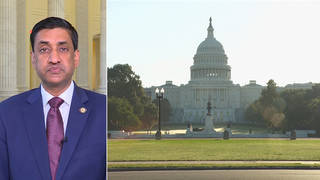
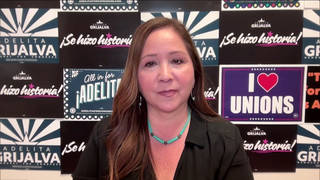
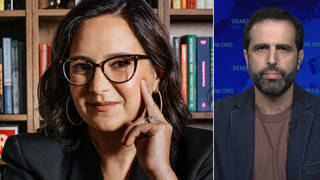
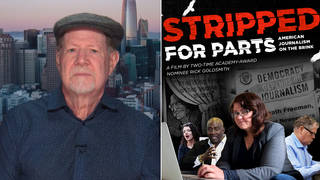





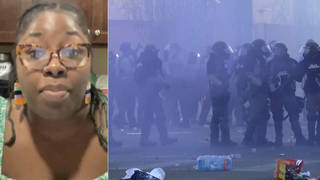

Media Options